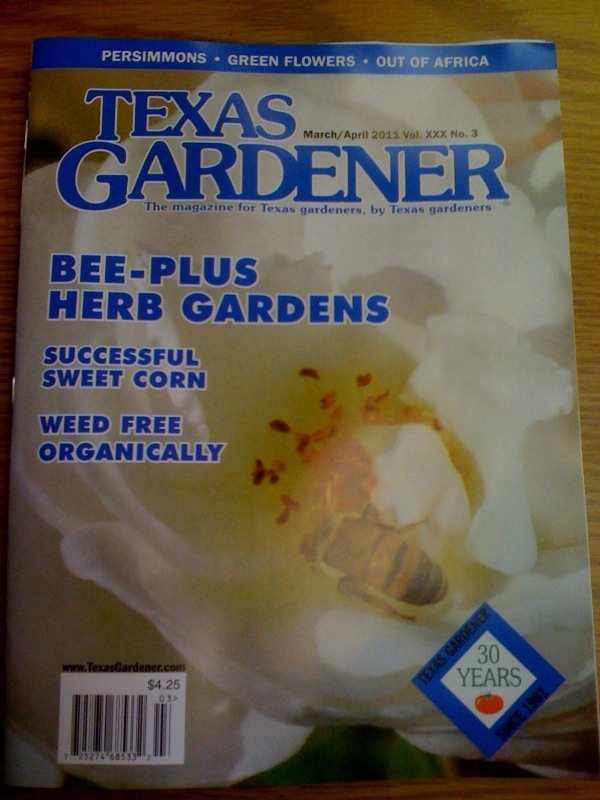 Last week I had the honor of speaking to the Bear Creek Master Gardener’s group in Houston. The group invited me to give what I like to call a “lunch and learn”. They grilled hamburgers for the members and then everyone settled in for the talk. There were over 150 Master Gardeners in attendance. Now there is of course a danger of doing a talk at lunch. You know what a comfortable room and a full tummy can do. Luckily for my ego, I did not see too many people dozing off during my presentation.
Last week I had the honor of speaking to the Bear Creek Master Gardener’s group in Houston. The group invited me to give what I like to call a “lunch and learn”. They grilled hamburgers for the members and then everyone settled in for the talk. There were over 150 Master Gardeners in attendance. Now there is of course a danger of doing a talk at lunch. You know what a comfortable room and a full tummy can do. Luckily for my ego, I did not see too many people dozing off during my presentation.

The cover of the Texas Gardener issue that led to my "Weed Free-Organically" presentation for the Bear Creek Master Gardeners.
The presentation was entitled “Weed Free Organically”. It was based on an article that I did for Texas Gardener several months ago. In my talk, I emphasize a four pronged approach (I call it the 4 P’s)to organic weed control. The first “P” in my program is “Preparation”. If you are going to have any luck at all controlling weeds organically, you are going to have to do proper bed preparation to remove as much plant material as possible. Solarization and smothering are the two best methods that I have found to remove all of the vegetation from a large-sized bed. Proper bed preparation will make the other “Ps” much more effective.
“Pre-emergent” methods are the second part of the 4P approach. There are not a lot of pre-emergent weapons available in the organic gardener’s arsenal. Corn Gluten Meal is one. It has been shown to be effective in field trials at Texas A&M. However, the most effective pre-emergent tool a gardener has is mulch. Mulch is by far and away the best thing you can do in your garden. It deprives young weed seeds the light they need to germinate, feeds the soil, conserves moisture, insulates roots and then turns into compost. I cannot over emphasize the importance of mulch in the garden. We talked about when to mulch, how to mulch and what to mulch with. In fact, probably on third of the one hour talk was dedicated to this very important topic.
The next “P” in the 4P approach is post-emergent tools. Ideally, you don’t want to have to use post emergent weed control methods at all. In the ideal world, you would have no weeds that needed to be pulled or killed. However, since we don’t live in a perfect world, we discussed the use of acetic acid as a safe and effective herbicide. We also discussed good hand weeding techniques and new tools (the circle hoe) that speed up your weeding chores. We also talked about burning your weeds ( a very effective favorite of mine) and boiling water (an almost useless exercise).
The final “P” in the 4P method is persistence. Like I reiterate each time I talk about organic weed control, I use all of these methods in my garden and I still have weeds. However, by persistently using these methods year after year I get fewer and fewer weeds each season.
I would like to say a great big Thank You! to Teresa See for inviting me to talk with this outstanding group of gardeners. Teresa is the the second Vp for the group and she is also responsible for the Library and Welcome Garden. She was so welcoming and her spirit was indicitive of the entire group. Their hospitality and receptiveness made for one of the most enjoyable afternoons that I have had in a long time. The Bear Creek Master Gardeners regularly feature speakers on a wide range of topics. All of their programs are at the Bear Creek Agrilife Extension facilities. On Oct. 18, Jeanie Dunnihoo will be presenting “Herbs” at 7:00 p.m. Joe Masabni, from Texas A&M Agrilife Extension will present “Raised Bed Gardening” on Nov. 1. That is the “Hamburger Tuesday” meeting. Burgers are $3. The meal is optional so feel free to attend the lecture “sans food” if you like. Also, all of these talks are open to the public so be sure and invite all of your non Master Gardener friends!



Mulch Question:
My most abundant mulch is pine straw. The low pH of decomposing pine straw is great for tomatos, but some plants like snow peas prefer neutral pH. Can I use the ashes from my charcoal grill to raise the pH in pine straw mulch?
Weyman
Pingback: Week 32 Tips for the Zone 9 Garden |
I seeded perinial rye before sept 15 and we had a four day spike into the90s. Is thisoingbto hurt the germination
It may. I would make sure to put out lots of water and pray for cooler nights. If we get the 20 to 30 degree spread we will be ok.